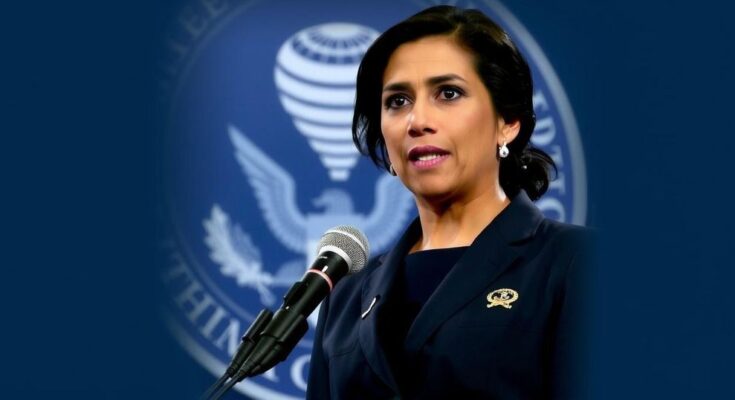Tulsi Gabbard, former Democratic congresswoman and recent Republican convert, has been appointed by Trump as director of national intelligence. Her nomination faces scrutiny due to doubts about her experience and past accusations of promoting Russian propaganda. While she previously supported progressive policies, Gabbard’s recent controversial statements about Syria and Ukraine bring into question her capability to manage such a significant role overseeing U.S. intelligence agencies.
Tulsi Gabbard, a once Democrat congresswoman who recently aligned with the Republican Party, has been appointed by Donald Trump as the director of national intelligence. This pivotal role places her at the helm of U.S. intelligence agencies like the CIA and NSA, overseeing a staggering budget exceeding $70 billion and managing 18 distinct intelligence entities. However, her nomination is laden with scrutiny, primarily due to her alleged history of parroting Russian narratives and evident lack of intelligence experience. Gabbard’s journey into politics is marked by notable achievements. She made history as the youngest person elected to the Hawaii State Legislature at just 21 years old, later representing Hawaii in Congress from 2013 to 2021 as the first Hindu member of the House. Initially a proponent of progressive issues like universal healthcare and gun control, she shifted her allegiance after declaring that the Democratic Party was a group of “elitist cabal of warmongers.” Her controversial remarks concerning foreign affairs have stirred much debate. Gabbard faced backlash during her 2019 presidential run as her views on Syria and apparent support for Assad raised eyebrows; she controversially doubted the Syrian government’s culpability in chemical attacks. Even as Russian aggression escalated in Ukraine, she made statements that have led critics to label her rhetoric as Russian propaganda. Following her claims about the existence of U.S.-funded biolabs in Ukraine, Republican Senator Mitt Romney expressed concern over her alignment with “actual Russian propaganda.” Gabbard’s comments have not only ignited anger among political rivals but also caught the attention of foreign media, suggesting that her leadership could complicate U.S. relations with Ukraine amidst the ongoing conflict. Gabbard’s nomination is intricately woven into the fabric of current geopolitical tensions, drawing a precarious line between loyalty and scrutiny. She now stands on the brink of either fortifying America’s intelligence oversight or potentially muddling its diplomatic efforts abroad. As the Senate prepares for her confirmation hearing, both critics and supporters are poised to invest their hopes or fears in what her appointment will ultimately herald. “Not only is she ill-prepared and unqualified, but she traffics in conspiracy theories and cozies up to dictators like Bashar-al Assad and Vladimir Putin,” said Virginia congresswoman Abigail Spanberger, encapsulating the stern resistance against Gabbard’s nomination.
Tulsi Gabbard’s appointment as director of national intelligence is set against a backdrop of deep political divides and complex geopolitical tensions. Once a rising star in the Democratic Party, her shift to embrace conservative values and support for Trump has raised eyebrows across the political spectrum. Her history of controversial statements regarding foreign leaders and events like the Syrian Civil War and the ongoing invasion of Ukraine adds layers of complexity to her prospective role overseeing American intelligence operations, a field repeatedly scrutinized for its influence on national security.
In summary, Tulsi Gabbard’s nomination as director of national intelligence is a significant pivot in her political career, transitioning from a Democrat championing liberal policies to a Republican key player amid international controversies. With potential ramifications for U.S. intelligence practices and foreign diplomacy, especially concerning Ukraine and Russia, her Senate confirmation will be keenly monitored as the public questions her qualifications and political ideology.
Original Source: www.bbc.com



